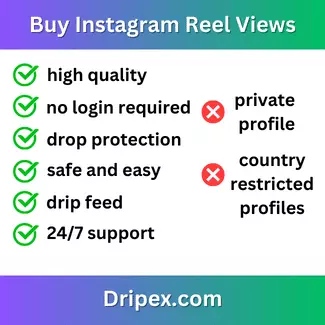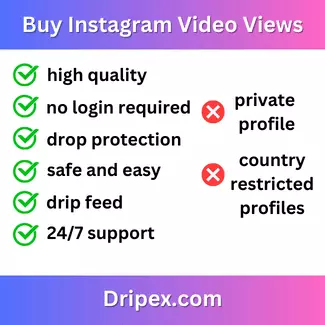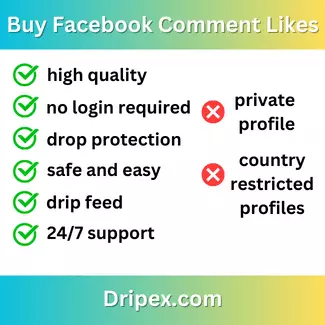
Boost your Facebook engagement with Dripex. Buy real and customized comments today and take your social media game to the next level.
-

Buy 5 Facebook Comments ~ $5.00 – $105.00 USD
Boost your Facebook engagement with 5 custom comments. Buy now and increase your social media presence and online visibility.
-

Buy 10 Facebook Comments ~ $10.00 – $110.00 USD
Take your social media game to the next level! Buy 10 custom Facebook comments and maximize your impact and online engagement.
-

Buy 20 Facebook Comments ~ $20.00 – $120.00 USD
Boost your sales and drive traffic to your Facebook page with 20 high-quality comments. Buy now for maximum engagement and ROI.
-

Buy 25 Facebook Comments ~ $25.00 – $125.00 USD
Boost your online reputation with 25 Facebook comments! Buy now and increase engagement, credibility, and visibility. Affordable prices
-

Buy 50 Facebook Comments ~ $50.00 – $150.00 USD
Boost your social media presence with 50 Facebook comments! Buy now and expand your influence on the world’s largest social network.
-

Buy 100 Facebook Comments ~ $100.00 – $200.00 USD
Ready to take your social media to the next level? Buy 100 Facebook comments now and watch your engagement soar!
Buy Facebook Comments: Real, Active, Custom – Boost Your Engagement with Dripex
In today’s digital world, social media is an integral part of our lives. From personal to professional, we rely on social media platforms to connect, engage and communicate with people. Facebook is the largest social media platform with over 2.8 billion active users. It is not only a great platform for personal connections but also for businesses to reach their target audience. In order to increase engagement on Facebook, one effective way is to buy Facebook comments. In this article, we will discuss how buying Facebook comments can help you and how Dripex can assist you in achieving your goals.
How Buying Facebook Comments Can Help Boost Your Engagement
In today’s digital age, social media has become an indispensable part of our lives. It serves as a medium for personal as well as professional connections and communications. With over 2.8 billion active users, Facebook is the largest social media platform. It offers great potential for businesses to connect with their target audience and increase engagement. One effective way to achieve this is by buying Facebook comments.
Why Buy Facebook Comments?
Facebook comments are an essential metric for measuring engagement on your posts. The more comments your posts receive, the more likely they are to be seen by other users. Buying Facebook comments can help you jumpstart your engagement and increase your reach.
When you buy Facebook comments from a reputable provider like Dripex, you can ensure that the comments are relevant to your post and come from real accounts. This not only helps boost your engagement but also improves your credibility and authenticity on the platform.
How Dripex Can Help You
Dripex is a trusted provider of social media marketing services, including buying Facebook comments. With their expertise and experience, they can help you increase your engagement and reach on Facebook.
Their process is simple and effective. All you have to do is select the package that suits your needs, provide the link to your post, and sit back and relax while they deliver high-quality comments from real accounts.
Overall, buying Facebook comments can be a great strategy for businesses looking to increase their engagement on the platform. It is important to choose a reputable provider like Dripex to ensure the comments are relevant and authentic. With their help, you can take your Facebook presence to the next level and reach a wider audience.
The Importance of Facebook Comments
Facebook is not just a platform to post photos and videos; it is a platform to interact and engage with people. Comments are a way to start conversations, and they also serve as social proof of your post’s popularity. When people see a post with a lot of comments, they are more likely to engage with it as well. Additionally, comments on Facebook can help increase the visibility of your post, as it signals to the algorithm that your post is engaging and should be shown to more people.
Buying Facebook photo comments can be important and useful for businesses looking to enhance their online presence and engagement. Photo comments can be more visually appealing and attention-grabbing than text-only comments, making them more likely to attract user attention and interaction. Additionally, buying photo comments from real accounts can create social proof and increase the credibility of a brand’s online presence. This can ultimately lead to higher customer trust and loyalty, increased sales and revenue, and a more positive brand image. Overall, buying Facebook photo comments can be a valuable investment for businesses looking to improve their social media marketing efforts.
Benefits of Buying Facebook Comments from Dripex
Dripex is a reputable social media marketing company that offers a range of services, including buying Facebook comments. Here are some benefits of buying Facebook comments from Dripex:
Real and Active Comments
Dripex provides real and active comments from real Facebook users. These comments are not generated by bots or fake accounts, which means they are more valuable and engaging. Real and active comments can also help you avoid being penalized by Facebook for using fake engagement tactics.
Experts emphasize the importance of buying real active Facebook comments because it can significantly boost a company’s social media presence and online reputation. Real comments from active accounts can provide social proof, increase engagement, and create a sense of community around the brand. These factors can ultimately lead to higher customer trust and loyalty, increased sales and revenue, and a more positive brand image. In contrast, buying fake or inactive comments can have the opposite effect, damaging a company’s credibility and reputation.
Custom Comments
Dripex allows you to choose the comments you want to receive. You can provide your own comments, or you can choose from a list of pre-written comments. This ensures that the comments are relevant to your post and audience.
Drip-Feed Delivery
Dripex offers drip-feed delivery of comments, which means the comments will be delivered over a period of time rather than all at once. This can make your engagement appear more organic and natural, avoiding any suspicion of fake engagement.
Safe and Secure
Dripex uses safe and secure methods to deliver comments, ensuring your account is not at risk of being flagged or banned by Facebook.
FAQs:
What are Facebook comments?
Facebook comments are the written responses left by users in response to a post or status update on Facebook.
Why would someone want to buy Facebook comments?
Buying Facebook comments can help boost engagement on a Facebook page or post, which can lead to increased visibility and credibility. It can also help to create a sense of community and interaction on the page.
What types of Facebook comments can be purchased?
Comments can be purchased in different styles, such as positive comments, negative comments, or custom comments tailored to a specific post or page. They can also be purchased from real, active users or from bots.
Is buying Facebook comments ethical?
The ethical implications of buying Facebook comments can be debated. While it can help to boost engagement and visibility, it can also be seen as inauthentic and manipulative. It is important to consider the potential consequences and make an informed decision.
Where can I buy Facebook comments?
There are a variety of websites and services that offer Facebook comments for purchase, including Dripex. It is important to research and choose a reputable and reliable service that provides real, active comments.
What should I do if I don’t get many comments on my Facebook posts?
If you’re not getting many comments on your Facebook posts, there are a few things you can do to encourage engagement. Try asking questions, sharing content that is relevant and interesting to your audience, and responding to comments in a timely manner. You can also join Facebook groups related to your niche or industry to connect with like-minded individuals and increase the visibility of your posts.
How do I respond to negative comments on Facebook?
When responding to negative comments on Facebook, it’s important to remain professional and avoid getting defensive. Acknowledge the issue and offer a solution if possible. If the situation cannot be resolved through Facebook comments, offer to take the conversation offline through email, phone, or in-person communication.
Can comments on Facebook really help increase the visibility of my post?
Yes, comments on Facebook can help increase the visibility of your post. When the Facebook algorithm detects that a post is receiving a lot of engagement, including comments, it is more likely to be shown to a wider audience. Additionally, comments serve as social proof of your post’s popularity, which can encourage others to engage with it as well.
Are there any downsides to commenting on Facebook posts?
While commenting on Facebook posts can have many benefits, there are also some potential downsides to consider. Posting a comment on a public post can expose your personal information and opinions to a wide audience, which may not always be desirable. Additionally, some comments can be hurtful or negative, which can impact your mental health and well-being. It’s important to use discretion when commenting on Facebook posts and to prioritize your own safety and well-being.
In conclusion, buying Facebook comments from Dripex can be a valuable strategy to increase engagement on your Facebook posts. It can help you jumpstart your engagement, increase your visibility and potentially gain more followers. Dripex is a reputable social media marketing company that offers real, active and custom Facebook comments with drip-feed delivery, ensuring safe and secure delivery. With Dripex, you can boost your engagement on Facebook and take your social media presence to the next level.
-

The Power of Buying Unique Facebook Comments for Your Business
Boost your business’s online reputation, engagement, and growth by unlocking the power of unique Facebook comments.
-

Customize Social Strategy with Tailored Facebook Comments
Boost your social media game with tailored Facebook comments. Stand out and connect with your followers on a deeper level.
-

The Benefits of Buying Genuine Facebook Comments for Your Business
Boost your business on Facebook with authentic comments. Buy comments to increase your online presence today.
-

Increase Your Reach: Buy Authentic Facebook Post Comments
Looking to expand your reach on Facebook? Buy authentic post comments to increase engagement and attract a wider audience.
-

Some Inspiring Motives and Facts to Buy Facebook Comments Fiverr
Looking to boost your Facebook engagement? Check out Fiverr for inspiring facts on how buying comments can enhance your online presence.
-

The Importance and Usefulness Associated with Buy Facebook Photo Comments
Want to increase your Facebook photo engagement? Discover the importance and usefulness of buying Facebook photo comments
-

Buy Facebook Comments Cheap and Boost Your Engagement Now with Dripex
Maximize your Facebook engagement without breaking the bank. Buy Facebook comments cheap from Dripex and watch your posts soar. Get started now!
-

Friendly and Convenient Directions for Customers to Buy Active Facebook Comments
Get more engagement on your Facebook posts with active comments! Follow our user-friendly guide to buy active Facebook comments.
-

Right Situations for the Professionals and Companies to Buy Real Facebook Comments
Looking to boost your credibility on social media? Buy real Facebook comments from professionals to increase engagement and reach.
-

Key Reasons for Companies to Buy Facebook Comments
Enhance your online presence and engage with your audience by purchasing Facebook comments. Discover key benefits for your business today.




























